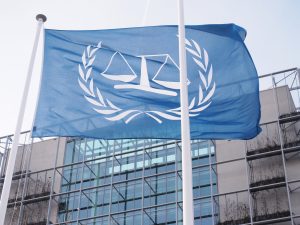 Michelle Coleman is a Lecturer in Law at Swansea University
Michelle Coleman is a Lecturer in Law at Swansea University
On September 17, 2021, Rehman Chishti and Knox Thames wrote a blog post for the New Atlanticist calling for the US and UK governments to label the crimes committed by Myanmar’s military against the Rohingya Muslims a “genocide.” Specifically, they call for this label to be used by the United States and United Kingdom during the United Nations General Conference. They argue that identifying this situation as a genocide would remind the world that there is an ongoing conflict with atrocities being committed, create pressure that would discourage the new Myanmar government from continuing these atrocities, and encourage the US and UK to refer to matter to the International Criminal Court or use universal jurisdiction to prosecute those involved.
These are admirable goals. The Rohingya Muslims have suffered varying degrees of persecution since the 1970s. The situation escalated in 2017 however when Rohingya militants attacked 30 police posts. Myanmar’s army responded to those attacks by destroying at least 288 villages, killing thousands, and driving 700,000 Rohingya out of the country. The violence against the Rohingya people continues to this day.

Countries and individuals can be accused of committing genocide, which appears to be what the original blog post advocates. Labeling the situation a genocide, however, will not accomplish much. It may raise awareness and show the Myanmar government that the world community is watching, but simply calling the situation a genocide is nothing more than making an informal accusation. A label does not stop the violence. It also does not mean that someone will be held accountable; for that, a court judgment is necessary. Prosecution of the culpable members of the Myanmar military by the International Criminal Court is one avenue suggested by Chishti and Thames and is examined in this blog post. I think such a prosecution is extremely unlikely, and whether the US and UK accuse Myanmar of genocide will not make any difference as to whether such a prosecution will become a reality.
Genocide is an international crime
While it is certain that Rohingya Muslims are suffering at the hands of the Myanmar government, identifying the situation in Myanmar as a genocide is a controversial issue. Genocide is an international crime. As such, it has a very specific definition that requires the “intent to destroy, in whole or in part, a national, ethnical, racial or religious group.” Thus, one of the reasons for the attack must be because of the victims’ group membership, and one purpose of the attack must be to destroy at least part of that group.
So, if the Rohingya are being targeted for an attack either because they are part of their ethnic or religious group (Rohingya Muslims) and they were being targeted with the intent to destroy that group, it would be genocide. However, if there is another intent or purpose behind the attack, for example, if the purpose is genuinely rooting out insurgents, or the group membership is not the reason they are targeted, then the situation cannot amount to genocide as a matter of law. Therefore, just because a country might label a situation as a genocide, does not make it so. Because it is a legal issue, situations can be determined to be a genocide through an International Court of Justice judgment declaring that the Genocide Convention has been violated, prosecution at the International Criminal Court, or prosecution through the use of universal jurisdiction. A bilateral declaration of genocide by two world governments is not legally binding and would likely do little to improve the situation of the Rohingya.
Genocide and Crimes Against Humanity
Genocide is not the only international crime that might apply in this situation. The same underlying actions that makeup genocide can also constitute crimes against humanity. Murder and killings, causing serious harm to physical or mental health, extermination, forcible transfer of children, and enforced sterilization are all examples of the underlying actions that might prove both genocide and crimes against humanity (see Article 7.1. of the Rome Statute). The real difference between the two crimes is about intent. Where genocide requires targeting an identifiable group of people with the intent to destroy that group, crimes against humanity only require intent to attack civilians. Thus, crimes against humanity can be just as serious in the harm done to the victims and easier to prove because of the less complicated intent element.
Intention for the crime of genocide is complicated and difficult to prove. This can be seen in the Rohingya situation, where one open issue is the element of intent to destroy. Both the current and former governments of Myanmar deny that a genocide is occurring. They claim that the ongoing violence against the Rohingya people is a result of legitimate actions to root out and stop Rohingya insurgents from committing terrorist attacks. Meanwhile, foreign governments, most notably the Gambia, and NGOs have claimed that the ongoing attacks amount to genocide. Answering this question will require determining the motivation of the Myanmar government and/or army and also examining the attacks from the perspective of humanitarian law.
Myanmar and the International Criminal Court
Chishti and Thames argue that the US and UK should declare that the actions taken against the Rohingya constitute a genocide to better enable them to introduce a United Nations Security Council (UNSC) resolution instructing the International Criminal Court to investigate the situation. The UNSC can refer cases to the International Criminal Court in situations where the Court would otherwise not have jurisdiction. This has happened on two previous occasions in the form of referrals of the situations in Libya and Sudan. Unfortunately, any such resolution is almost certainly doomed to failure. As suggested in Chishti and Thames’s post, both China and Russia would almost certainly use their permanent vetoes to block the resolution. China in particular would be extremely unlikely to agree to refer because of its economic and political ties to Myanmar.

In the absence of a UNSC resolution, there are really no other plausible grounds to support an International Criminal Court investigation. Myanmar is not a party to the Rome Statute which severely limits the extent to which the Court can act in this situation. The Rome Statute provides that the International Criminal Court only has jurisdiction over crimes that occur either within a country that is a state party or when citizens of a state party either commit or are victims of a particular crime. The International Criminal Court does not have jurisdiction over any crimes committed in Myanmar, including genocide. The crime is alleged to have occurred within the territory of Myanmar and all of the potential perpetrators and victims are citizens of Myanmar. As a result, the relevant jurisdictional requirements have not been met to permit the International Criminal Court to prosecute members of Myanmar’s government for genocide.
Despite these initial jurisdictional issues, and regardless of whether the Security Council successfully refers the matter to the International Criminal Court, the Prosecutor has already opened an ongoing investigation into the alleged crimes committed in the situation regarding the Rohingya people. In particular, it is investigating whether the government of Myanmar committed the crime against humanity of deportation by forcing members of the Rohingya ethnic group across the border into Bangladesh. The Court has determined that it has jurisdiction over this crime because the Rohingya entered Bangladesh, a state party to the Rome Statute, and that by crossing the border some part of the crime occurred in place over which the court has jurisdiction. While this investigation is obviously limited, it could provide some accountability for those who have committed crimes against the Rohingya.
Conclusion
The International Criminal Court is in somewhat of a bind in the situation regarding Myanmar and has developed an interesting solution. Prosecuting people for genocide in Myanmar is impossible without a Security Council referral, which is very unlikely, even if the US and UK were to accuse Myanmar of genocide. The possibility of prosecuting people from Myanmar for crimes against humanity that were partially committed within the territory of Bangladesh provides a potential route to some criminal accountability. This route, however, has already been pursued without countries needing to publicly accuse Myanmar of genocide. Accusations from the US and UK would not help the International Criminal Court gain jurisdiction over the case, and therefore the Court would still be unable to prosecute people in Myanmar for genocide in this situation.
Having the US and UK declare the situation in Myanmar a genocide might raise awareness of the ongoing situation although it is doubtful that it will spur the United Nations and other countries to take stronger action. As Chishti and Thames make clear, a similar statement about the Chinese government’s treatment of its Uyghur Muslim population was not accompanied by any real action by the international community. Further, a significant step has been taken to identify the situation involving the Rohingya as a genocide in the form of the ongoing case brought by the Gambia at the International Court of Justice. While the standard of proof is lower than at the International Criminal Court, a finding by the International Court of Justice that a genocide did take place will have much greater force than a bilateral declaration by the US and UK.
Genocide is a crime and as such its existence should be established by the courts. Further, from the perspective of international criminal law, whether the US and UK label the situation to be a genocide is irrelevant. Such a label is merely an accusation and does nothing to promote accountability in the international criminal context. Rather than focusing on what to call the crimes allegedly committed by Myanmar’s government, the US and UK would be better served to engage in more practical and direct ways of providing aid to the Rohingya Muslims.
